SNAPSHOTS OF PARIS
What do composers Léon Boëllmann, Francis Jean Marcel Poulenc, and Bohuslav Martinů have in common? According to François Chouchan and Julius Reder Carlson, the answer is Paris. The programmer/artistic director and resident musicologist of Le Salon de Musiques, the best Chamber Music outfit in Los Angeles, 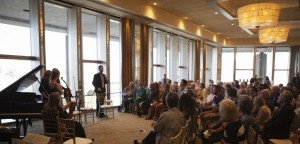 contextualized three sonatas written for cello and piano as a valentine to La Ville-Lumière (“The City of Light”).
contextualized three sonatas written for cello and piano as a valentine to La Ville-Lumière (“The City of Light”).
Chouchan’s musical perspicacity resulted in impeccable and astounding selections guaranteed to touch your heart and soul; throughout the season, he continually introduces or premieres astounding pieces which should be but sadly are often not standards in the repertoire. Carlson, erudite but never pedantic, began the evening with anecdotes and wisdoms behind the works’ creation, and he introduced the sonatas at hand as “a snapshot of Paris.”
The intimate gathering on the fifth floor of the Dorothy Chandler Pavilion was told that Poulenc, the only one of the three composers actually born in Paris, was at the center of Jazz Age avant-gardists who were clearly tolerant (Poulenc was openly gay). While his Sonata for Cello and Piano, Op. 143 wasn’t written until 1948, each 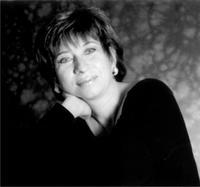 of the four movements, per Carlson, was perhaps a glimpse into his Paris life in the Twenties: we were instructed to listen for a fox trot dancer or an aria at the Opera House, and at the same time take notice of Poulenc’s irreverence and humor.
of the four movements, per Carlson, was perhaps a glimpse into his Paris life in the Twenties: we were instructed to listen for a fox trot dancer or an aria at the Opera House, and at the same time take notice of Poulenc’s irreverence and humor.
Czech-born Martinů came to Paris in 1923 to find his calling, but he wrote his Sonata for Cello and Piano No. 1, H 277 in 1939 while coming to terms with the Anschluss, so don’t expect comedy and impudence but intensity with moments of reprieve and nostalgia. Both the Poulenc and the Martinů were written for the legendary French cellist Pierre Fournier (1906 – 1986), who was also a private teacher. One of his students was John Walz, principal cellist of the LA Opera and co-artistic director of Le Salon de Musiques.
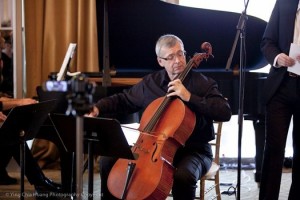 And it is precisely Walz who brought life to these works with pianist Edith Orloff. Never having been disappointed with one program at Le Salon, I nonetheless wondered how two players–regardless of the fact that they have performed together for 41 years and founded the Pacific Trio–could be as exciting as the Quartets and Sextets I had seen before. The duo was more than exciting; it was electrifying. The Poulenc is extraordinarily difficult to perform, and Walz, front and center, played with such clarity and power that the strings of his cello reverberated through my soul. His flair and lyrical musicianship make evident the argument for hearing music live.
And it is precisely Walz who brought life to these works with pianist Edith Orloff. Never having been disappointed with one program at Le Salon, I nonetheless wondered how two players–regardless of the fact that they have performed together for 41 years and founded the Pacific Trio–could be as exciting as the Quartets and Sextets I had seen before. The duo was more than exciting; it was electrifying. The Poulenc is extraordinarily difficult to perform, and Walz, front and center, played with such clarity and power that the strings of his cello reverberated through my soul. His flair and lyrical musicianship make evident the argument for hearing music live.
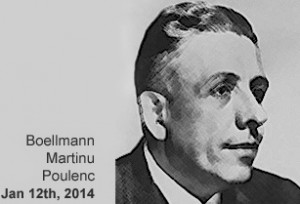 The Poulenc was indeed frolicsome; I even imagined Commedia Dell’arte characters bounding to life down a Paris street. And the wistful, romantic, and moving Cavatine summoned the image of a dying courtesan plodding through the snow looking for her Captain of the Guard. The spidery and whimsical intro of the Finale gave way to a tarantella of sorts, and Poulenc’s palette of colors in this movement were spiced to perfection by Orloff. Both players brought a surprising range of emotions to the Lento of the Martinů, an accomplishment considering how mysterious, ominous, and stealthy that movement is; and Orloff dexterously executed its fascinating quicksilver syncopations. The Allegro con brio with its repetitive digs and intricate fingerwork was a showcase for Walz, who was bursting with blistering vitality.
The Poulenc was indeed frolicsome; I even imagined Commedia Dell’arte characters bounding to life down a Paris street. And the wistful, romantic, and moving Cavatine summoned the image of a dying courtesan plodding through the snow looking for her Captain of the Guard. The spidery and whimsical intro of the Finale gave way to a tarantella of sorts, and Poulenc’s palette of colors in this movement were spiced to perfection by Orloff. Both players brought a surprising range of emotions to the Lento of the Martinů, an accomplishment considering how mysterious, ominous, and stealthy that movement is; and Orloff dexterously executed its fascinating quicksilver syncopations. The Allegro con brio with its repetitive digs and intricate fingerwork was a showcase for Walz, who was bursting with blistering vitality.
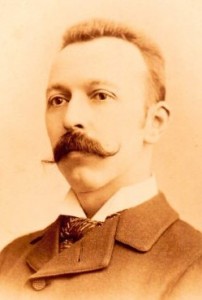 Here’s a link to their performance of the Martinu, the Poulenc, and movements II and III of the Boëllmann; but know that the sound quality is much better in person.
Here’s a link to their performance of the Martinu, the Poulenc, and movements II and III of the Boëllmann; but know that the sound quality is much better in person.
As for Boëllmann, the Parisian organist who died at only 35, his rarely heard Sonata for Cello and Piano, Op. 40 was a revelation. The first movement began with a yearning melody which soon evolved into jovial passages best described as a swashbuckling pirate dance. The Andante was so lush and romantic that I wasn’t sure whether to buy flowers for my sweetheart or crumble to the floor sobbing. The final movement, Allegro molto, mimics the textures of an organ (organic?) and sounds as if Boëllmann were paving the way for silent film accompaniment; it builds furiously and almost seems to be telling a story. It was stunning considering this was the players’ first time performing the Boëllmann, and I especially appreciated Orloff’s extraordinary pedalwork: She consistently utilized all three pedals as if impersonating an organ.
After the concert while sipping French Champagne, Walz regaled us with stories about what he learned from Fournier, including an anecdote about a Schumann work, and how sonority and articulation comes from the bow. Then the energized guests partook in a lovely buffet catered by Patina, chatting about all the disciplines of the arts. For one sweet special moment, the Left Bank of Paris came to downtown Los Angeles.
* * * * * * * * * * * * * *
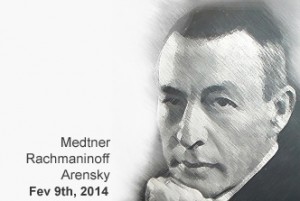 And now it’s time to embark on the Volga and feel the Russian Soul. Coming up on Feb. 9 is the most highly recommended Chamber Music event of the month (if not the year): “An All-Russian Affair,” which features Chamber pieces by Nikolai Medtner, Sergei Rachmaninoff and Anton Arensky. Walz and Orloff return to Le Salon joined by the amazing pianist Mona Golabek, star of The Pianist of Willesden Lane (which returns to the Geffen Playhouse Feb.25), and the astounding violinist Movses Pogossian, a Tchaikovsky International Competition prizewinner and First Prize winner of the USSR National Violin Competition.
And now it’s time to embark on the Volga and feel the Russian Soul. Coming up on Feb. 9 is the most highly recommended Chamber Music event of the month (if not the year): “An All-Russian Affair,” which features Chamber pieces by Nikolai Medtner, Sergei Rachmaninoff and Anton Arensky. Walz and Orloff return to Le Salon joined by the amazing pianist Mona Golabek, star of The Pianist of Willesden Lane (which returns to the Geffen Playhouse Feb.25), and the astounding violinist Movses Pogossian, a Tchaikovsky International Competition prizewinner and First Prize winner of the USSR National Violin Competition.
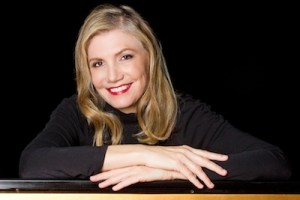 Learn the connections between Medtner (Two Canzonas with Two Dances for Violin & Piano Op. 43) and Rachmaninoff (Prelude & Danse Orientale Op. 2 and Elegie in E Flat minor Op. 3, No.1 for Cello & Piano), his best friend who supplied the greatest artistic and financial support during Medtner’s career. Medtner wrote a substantial number of compositions, all of which include the piano, and more than hundred songs. This is a paradox because he spent the last thirty years of his life in poverty. The name of Maharaja of Mysore may come up, as this philanthropist financed most of the recordings of Medtner’s works and founded the Medtner Society in London in 1949.
Learn the connections between Medtner (Two Canzonas with Two Dances for Violin & Piano Op. 43) and Rachmaninoff (Prelude & Danse Orientale Op. 2 and Elegie in E Flat minor Op. 3, No.1 for Cello & Piano), his best friend who supplied the greatest artistic and financial support during Medtner’s career. Medtner wrote a substantial number of compositions, all of which include the piano, and more than hundred songs. This is a paradox because he spent the last thirty years of his life in poverty. The name of Maharaja of Mysore may come up, as this philanthropist financed most of the recordings of Medtner’s works and founded the Medtner Society in London in 1949.
Here’s a peek at the Medtner–Alexander Labko (violin), Evgeny Svetlanov (piano):
http://www.youtube.com/watch?v=jQanUWw-w4Q
Despite his teacher Rimsky-Korsakov’s prediction that Russian Composer, Pianist and Conductor Anton Arensky (1861-1906) would soon be forgotten, he had a successful but short career before dying of tuberculosis at age 45. As a Professor himself at the Moscow Conservatory, his notable students included Rachmaninoff, Scriabin and Glière.
Here’s a peek at the 1st Movement of the Arensky–Sergey Koudriakov (piano), Maro Shinozaki (violin), Yo Kigoshi, cello:
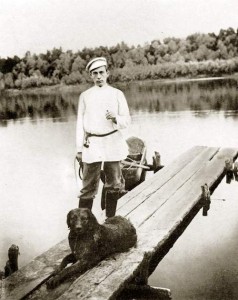 This unique and exquisite evening with Russian Romantics is followed by a Q & A and “Conversations Around a Samovar” (as Chouchan calls it): a gourmet buffet with French Champagne where you can mingle, exchange ideas, and meet the artists who will share their extensive knowledge of the pieces.
This unique and exquisite evening with Russian Romantics is followed by a Q & A and “Conversations Around a Samovar” (as Chouchan calls it): a gourmet buffet with French Champagne where you can mingle, exchange ideas, and meet the artists who will share their extensive knowledge of the pieces.
photos courtesy of Le Salon de Musiques
Le Salon de Musiques
Season 4, Concert 4
John Walz, cello; Edith Orloff, piano
played on January 12, 2014
coming up on Sunday February 9, 2014 at 4:00 pm
Dorothy Chandler Pavilion, 135 N Grand Ave, 5th Floor
Season 4, Concert 5
Moves POGOSSIAN (Violin)
John WALZ (Cello)
Mona GOLABEK (Piano)
Edith ORLOFF (Piano)
MEDTNER: Two Canzonas with Two Dances for Violin & Piano Op. 43
RACHMANINOFF: Prelude & Danse Orientale Op. 2 for Cello & Piano
RACHMANINOFF: Elegie in E Flat minor Op. 3, No.1 for Cello & Piano
ARENSKY: Piano Trio No.1 in D minor Op. 32
for tickets ($39 – $65, includes food and drink), call (310) 498-0257
or visit www.LeSalondeMusiques.com

